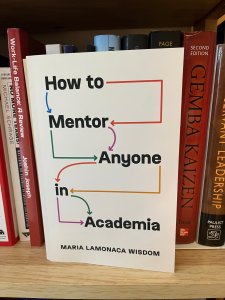Mentoring is a complex art, full of subtle interpersonal queues. Add to that the subtleties of navigating an academic environment, and mentoring can sometimes seem overwhelming. On top of that, many of those in today’s PhD programs are focused on jobs outside of academia, which can make the mentor’s task even more difficult. How can a mentor combine all these challenges for a successful outcome?

To answer, Maria LaMonaca Wisdom, assistant vice provost for faculty advancement at Duke University, offers her insights from career coaching in academic circles. She aims to make readers competent in career coaching for any mentee in academia, whether or not their career plans align with your personal interests.
How is that even possible? LaMonaca Wisdom advocates an approach to mentoring as a coach, instead of an all-knowing, all-powerful boss. Thus, the mentor’s job centers on bringing out self-efficacy and self-reliance in the mentee. Asking the penetrating questions – or just asking questions in the first place – to a mentee becomes a premium instead of providing the right answers.
This shift represents a relatively new practice in academe. It used to be that research faculty produced the next generation of research faculty. However, tenure-track faculty jobs have become harder to come by in recent years, and mentors have had to learn to coach outside of their personal experiences.
Plenty of professional coaching resources exist, but most mentors cannot afford the time and expense required to become a certified coach, like LaMonaca Wisdom has. Therefore, she distills this training into this book with an eye on the academic setting. She herself is a former literature professor who originally wanted to go into the teaching track, instead of the research track. She eventually grew passionate about academic advising, a path which led her to a role in professional coaching.
Of note, self-care is a defining component in her approach. Emotional and personal health represents the prime attribute that a mentor can offer a mentee since the mentor can’t completely predict the mentee’s career journey. She advocates a personal, not hierarchical, approach to mentoring driven by healthy curiosity, psychological boundaries, and continual growth.
Honestly, I found this conversational approach welcoming and helpful. The “all-knowing mentor” approach has always turned me off in the past, and I’ve benefited more from mentors willing to invest in me more pastorally than formally. Relationships, not hierarchies, seem to matter in today’s fluid world, and it’s time that academics learn how to capitalize on this strategy.
To date, this book is the best I’ve read about how to pursue this approach in an academic setting. Not only does it clearly recognize dynamics in today’s academy, but it also represents an honest, sustainable approach to mentoring. I fully recommend reading it if you want to bring your mentoring approach in sync with today’s challenges.
How to Mentor Anyone in Academia
By Maria LaMonaca Wisdom
Copyright © 2025
Princeton University Press
ISBN13 9780691248714
Page Count: 264
